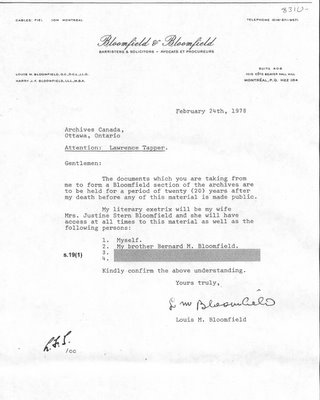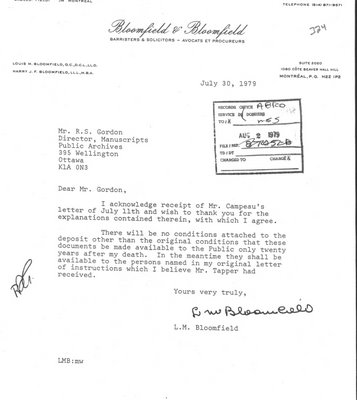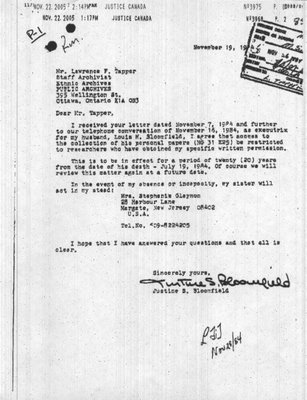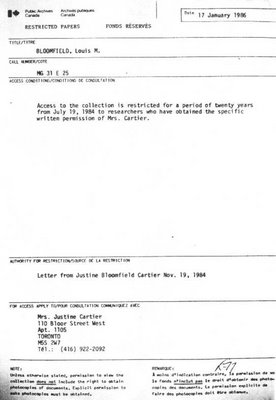THE BLOOMFIELD ARCHIVES: IS LIBRARY AND ARCHIVES CANADA SINCERE?
It is hard to understand why Library and Archives Canada (LAC) is still refusing to open the Bloomfield archives two years after the end of the 20 years access restriction asked by its creator, Louis Mortimer Bloomfield. To justify a supplementary restriction imposed to this collection. LAC invokes its intention to respect the donator’s will. But this explanation doesn’t resist serious scrutiny, to the point where we may ask ourselves if we are just in presence of a case of poor management or if LAC is not maliciously hiding to the public archives that even its donator wanted to be released.
When an institution receives the private archives of a citizen, the first question this establishment has to resolve is to determine when those papers could be open to public.
In the event where the collection is given by its creator’s succession, the families that transmitted this collection usually have full responsibility and power to impose a timeline of its opening and, in some case, to review it.
But, naturally, when the private archives are given by its creator himself during his lifetime, the institution should respect the expressed will of the donator. We may even say that, in this situation, the institution first responsibility is to make absolutely sure that it will enforce the expressed will of the donator, even if, decades later, his succession disagrees with this original intention. In such a case, we might even consider the high probability that the donator foresaw his entourage's hesitation, and that he consciously transferred his papers to a neutral institution which he trusted to respect his will. That an establishment can fail to fulfill such will is then a grave betrayal of this donator.
Louis Mortimer Bloomfield, while he was alive, did trust the Public Archives of Canada (PAC) and versed to it a collection of papers that the PAC qualified of great national value. At the time of this donation, Louis M. Bloomfield was a prominent lawyer and president of the International Law Association. At the time of this donation, PAC had for legal mission to collect documents of national importance and to guarantee their diffusion. It can’t be reasonably argued that this outstanding lawyer didn’t know what he was doing or the consequences of his donation to an institution that had for name PUBLIC Archives of Canada. The short letter that Bloomfield addressed to the archivist on Feb. 24, 1978, was quite clear and straightforward.

On the matter of restriction, its simply reads:
“The documents which you are taking from me to form a Bloomfield section of the archives are to be held for a period of twenty (20) years after my death before any of this material is made public.”
In the second paragraph, Bloomfield designated his wife as “literary exetrix” (sic) and allow her (and three others persons) to have access to his collection, without even suggesting that she may had any authority to restrict them for longer than 20 years.
If those instructions weren’t clear enough, a year and a half later, on July 30, 1979, Louis M. Bloomfield addressed another letter to the Public Archives in which he again stated the conditions of the documents transfer.

Again, there is no interpretation to be done of Bloomfield’s will. He stated clearly:
“There will be no conditions attached to the deposit other than the original conditions that these documents be made available to the Public only twenty years after my death.”
In the following phrase he just repeated his authorization for his wife, and three named peoples, to access his collection, without any reference of entitling anybody to change the terms of his will after his death.
With his will clearly expressed in two different letters, Mr. Bloomfield was surely trusting the Public Archives to know how to act in the event of his decease.
Louis Mortimer Bloomfield death occurred on July 19, 1984. Following this event, the Public Archives first acted in full respect of this donator’s will. They contacted his widow, by letter dated November, 7. (Regardless of many request to receive copy of all papers pertaining to the Bloomfield-PAC agreement, LAC never produced this letter.) Eventually, Mrs Bloomfield answered this letter on November 19, 1984 and acknowledged her husband’s will.

That letter is merely an acknowledgment of the unique condition set earlier by Louis Bloomfield, that is a confirmation of the 20 years embargo on his papers. In that letter, there is no specific clause regarding prolongation of this 20 years restriction. The phrase "Of course we will review this matter at a future date" can even be seen as an opening to lower this restriction before its end. Citing this letter as reference, PAC prepared a Restricted Papers Form in which the restriction period was stated as being of 20 years starting on July 19, 1984.

The Restricted Papers Form didn’t say a word about any possible revision or prolongation of the restriction. Seeing that everything was taken care of as he specifically asked for, the spirit of Louis Bloomfield was ready to rest in peace, confident that his archives will be opened 20 years later in 2004.
Surely, Louis M. Bloomfield would be disappointed to see that, 22 years later, the Public Archives of Canada didn’t respected his expressed will.
Surely, Louis M. Bloomfield would be disappointed to learn that Library and Archives Canada (LAC), the federal body that replaced PAC, not only forgot but actively refused to make public his archives, to the point of resisting this opening in Federal Court ?
Surely, Louis M. Bloomfield, the prominent lawyer, would be disappointed to see that LAC archivists and lawyers based their refusal on the fact that they see in Mrs. Bloomfield’s letter an agreement to let her review the duration of the restriction AFTER its termination and AGAINST her husband’s will.
Surely, Louis M. Bloomfield would be disappointed to see that, instead of being opened 20 years after his death, his valuable archives will remain secret 25 years after her widows’ death. Since Mrs. Bloomfield is still alive in 2006, that means they will stay closed at least up to year 2031; that is at least 47 years after her husband’s decease.
At a first level, we can deduct morale from this story: If you are alive and have valuable archives, don’t trust Library and Archives Canada, because, like Louis M. Bloomfield, you’ll surely be disappointed.
On a second level we are justified to ask ourselves an imperative question: Is LAC just misguided in its appreciation of its donator’s intentions? Or is LAC guided by some covert intentions?
If Louis Bloomfield's intentions of having his collection opened to the public is not clear enough by now, in the next post, we will see a letter he sent to the Public Archives in which he stressed the great historical value of his papers. This will be a good reading both because it shows that Bloomfield wanted his archives to be shared, but also because he is giving us a few hints on their content.

0 Comments:
Post a Comment
<< Home